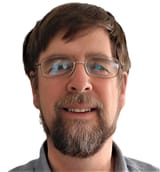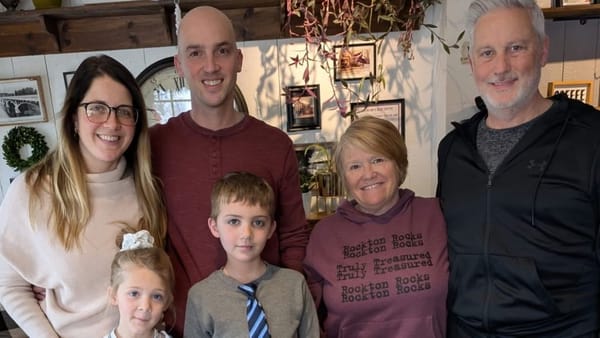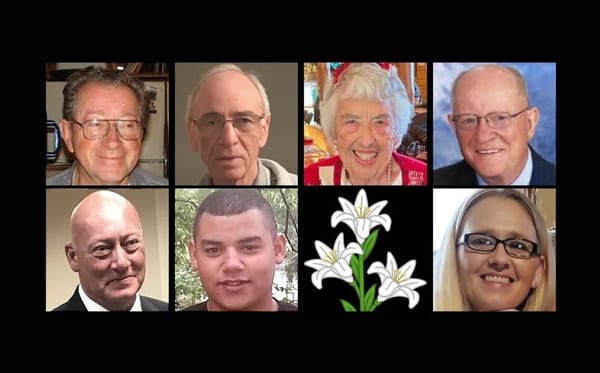Meet the candidates for Illinois State Senate District 45
Andrew Chesney and Gerald Podraza want to represent Roscoe and Rockton in Springfield.

Gerald Podraza and Andrew Chesney want to represent you in the Illinois State Senate.
Andrew Chesney, a Republican who has been State Representative in the 89th district since 2018, announced his candidacy for Illinois Senate District 45 after the incumbent, Brian Stewart, decided not run for re-election. Chesney calls Stewart his "mentor and friend.
Gerald Podraza, from the Chicago enclave of Norridge, runs a small industrial hemp farm and used to manage a micro-vineyard near Apple River (pop. 347). Though he wasn't on the Democratic primary ballot in June, more than 700 voters wrote his name in, making him the Democratic candidate in the general election. At age 78, he calls himself a "small business owner, National Farmers Union member, and grandpa." He has been a member of both the IFT and AFSME unions. He lives in Galena.
Chesney was raised in Shannon, Illinois (pop. 801), but he and his wife Kelly now reside in Freeport, where he was a city council member. He is an honors graduate of Arizona State University, receiving a degree in Communication in 2004. For over a decade he played a primary sales role in his family-owned business, Seaga Manufacturing, one of the world's leading makers of vending machines. Now aged 40, Chesney has since built a career in real estate.
Get coverage that's a little different, a little deeper, a lot more Roscoe and Rockton.
Podraza has a bachelors of science from Quincy University and a masters in music education from Southern Illinois University-Carbondale. He did graduate studies in photography/cinema at Columbia College Chicago and in human resource development/disabilities studies at Northeastern Illinois University in Chicago. He also worked on a PhD in public policy analysis/ethnography of communication at the University of Illinois, Chicago.
As an Education to Careers coordinator, he worked for local schools, for the Chicago Board of Education, and with two federally-funded projects that served over 60 private schools, institutions, and rehabilitation agencies in the Chicago metro area.
Though the two candidates are a generation apart, they share some common values. Both say they are against political corruption and they both have ideas for change. Podraza wants to bring more businesses and funding into rural parts of the district. Chesney wants more tax money sent from Springfield to local municipalities, taking the pressure off increasing local property taxes.
Podraza is an active promoter of "rural transport infrastructure," especially a Dubuque-Chicago passenger train, similar to the Twin Cities Zephyr which ran between Chicago and Minneapolis/St, Paul. Podraza says, "This line will connect our region with specialists and skilled talent in various fields. It can help save lives, grow businesses and improve property values."
Chesney agrees that, "infrastructure maintenance and expansion is critical to growth in [our] District. I will be a tireless advocate to build coalitions, find policy solutions and ensure fair funding in a way that addresses the transportation needs of [our] District."
Local news and local issues need your local support.
But the two candidates have differing views on other issues, including gun control. Chesney says, "Throughout my life, I’ve been a hunter, a member of a shooting range, and a holder of a concealed weapons permit, both in Arizona and Illinois. Consequently, I understand and appreciate the rights and responsibilities found in the 2nd Amendment. I am opposed to legislation that restricts our 2nd Amendment rights."
Podraza has a contrasting viewpoint. He says, "All military style weapons must be permitted, licensed, and insured. Equivalent to obtaining a CDL driver's license with a tanker endorsement. That means, weapon[s] must be registered/licensed, a training module must be completed, a skills based evaluation successfully passed in order to obtain a permit, and an insurance policy obtained."
One controversial issue in Illinois right now is the SAFE-T Act, particularly the part called the Pretrial Fairness Act [PDF], which eliminates cash bail. The Pretrial Fairness Act is set to take effect on January 1, 2023. Winnebago County State’s Attorney J. Hanley publicly opposes the SAFE-T Act but says, "Our state would do well to model its pretrial fairness law after New Jersey’s 2017 move to a cashless bail system." Even Gov. Pritziker, a supporter of the SAFE-T Act, agrees it's not clear whether the act would release inmates already in jail. If it does, Hanley estimated that more than half the inmates currently held in Winnebago County Jail would be set free. He didn't say how many of them are charged with nonviolent offenses.
In contrast, Chesney calls for a "full repeal of the SAFE-T Act." He believes that if the law isn't repealed by January 1, "criminals including violent offenders will have a lot more rights and police and prosecutors will be severely undermined in their ability to do their jobs, putting families across Illinois at-risk... I believe the elimination of cash bail, particularly as it’s written in the SAFE-T Act, will dramatically reduce public safety and lead to more crime, particularly more violent crime in Illinois." Like Hanley, Chesney has several other objections to the law as well.
When Podraza was asked if he would repeal the SAFE-T Act, he said, "NO! People who do non-violent crimes that demonstrate no involvement with enabling others... need not be in jail till [their] court date." For example, Podraza believes there is a significant "difference between using illegal drugs and selling them." Podraza proposes that "a monitor should be assigned to the individual" until their court date, like a "probation officer but in reverse," to act as a mentor.
The candidates hold divergent opinions on abortion. Podraza says, "Women create life. Women’s rights promote life. I support women’s rights and will work to support women’s rights, LGBTQ rights and human rights for all." Without using the word "abortion," Podraza says he supports the "right to all Reproductive Health options" and is in favor of family planning options.
Chesney would oppose using tax dollars to pay for abortions but would not oppose abortion when the life of the mother is jeopardized. On his website he says, "I am Prolife but make exceptions for pregnancies that are the result of rape or incest..." He did not explain why. Still, Chesney agrees, "The issue of abortion is very personal and very emotional and many people have strong feelings on both sides of the issue."
The candidates also disagree on exactly how to help the economy. Chesney voted against raising the minimum wage to $15 an hour. Podraza likes to point out that, since we invest hundreds of thousands of dollars to raise and educate a child, why would we settle for a return on that investment of only $15 an hour? Podraza also supports subsidies for wind and solar energy, which Chesney voted against.
On education, Chesney says, "I believe that education is best when the local school boards and authorities are in control. There are too many state mandates that add costs to local educational institutions and taxpayers with little benefit to the children in the schools who should always be our focus.... We have an antiquated school funding formula that seems to reward political clout over results."
Podraza says, "I have [an] education background and, unlike my competitor, I understand the issues around it. I respect education and educators, whether by professional schools for specific employment or traditional schools." Podraza says his top priority would be "education funding at all levels and working to forge and improve school-industry relations," adding that "apart from opening up career opportunities, it could also help improve [the] economy and reduce crime."
Make sure you get our free newsletter.
Chesney's father Steven Chesney, the president of Seaga Manufacturing, has made his son's largest campaign contributions, sometimes $50,000 a year. Total contributions to Chesney's campaign, from all sources, exceed $879,000 over four years. More than half of the 702 gifts were under $300. Fourteen gifts were over $10,000, such as from the Illinois Republican Party, Dinan & Company, Z Financial, and Fischer Excavating of Freeport.
On the other hand, Podraza had received about $500 from county Democratic organizations by Oct. 1. The $2,024 spent for printing, postage, and t-shirts came mostly out of his own pocket.
Podraza faces at least one disadvantage: the new boundaries of Illinois Senate District 45 were drawn to favor a Republican candidate, which he isn't. The district extends west to the Mississippi River, including Oregon, Genoa, and Galena, and encompasses Roscoe, Rockton, South Beloit, and most of Machesney Park. The borders pointedly carve out Rockford and Belvidere into District 34, making Republican victories much more likely in District 45 but much less likely in District 34. The data website FiveThirtyEight calculated that our Congressional District 16, whose boundaries were drawn by the same process, would favor the Republican candidate by 24 points.
During the redistricting process in June 2021, Republicans and Latino activists brought a lawsuit against Democratic leaders, arguing that their legislative maps violated the equal protection clause of the U.S. Constitution. But the court cited a previous decision saying that, while it's unconstitutional to manipulate district boundaries to favor members of one race or religion, manipulating district boundaries to benefit one political party is expected in Illinois.
Podraza understands the odds against him, but says, "This region has entrenched politicians with many rich backers who have not been challenged much."
Chesney says, "Unfunded mandates dictated by Springfield politicians and now crippling laws that strip law enforcement of their authority and enabling criminals are the types of legislation that I will always oppose."





